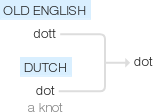Dot
Old English dott ‘head of a boil’. The word is recorded only once in Old English, then not until the late 16th century, when it is found in the sense ‘a small lump or clot’, perhaps influenced by Dutch dot ‘a knot’. The sense ‘small mark or spot’ dates from the mid 17th century.
wiktionary
From Middle English *dot, dotte, from Old English dott(“a dot, point”), from Proto-West Germanic *dott, from Proto-Germanic *duttaz(“wisp”). Cognate with Saterland Frisian Dot, Dotte(“a clump”), Dutch dot(“lump, knot, clod”), Low German Dutte(“a plug”), dialectal Swedish dott(“a little heap, bunch, clump”).
From French dot.
etymonline
dot (n.)
"point or minute spot on a surface," Old English dott, once, "speck, head of a boil," perhaps related to Norwegian dot "lump, small knot," Dutch dot "knot, small bunch, wisp," Old High German tutta "nipple;" a word of uncertain etymology.
Known from a single source c. 1000; the word reappeared with modern meaning "mark" c. 1530; not common until 18c. Perhaps this is a different word imitative of "the mark of a mere touch with the pen" (Wedgwood). In music, the meaning "point indicating a note is to be lengthened by half" is by 1806. Morse telegraph sense is from 1838. On the dot "punctual" is 1909, in reference to a clock dial face. Dot-matrix in printing and screen display is attested by 1975.
dot (v.)
1740, "mark with a dot or dots," from dot (n.). Sense of "mark or diversify with small, detached objects" is by 1818. Sense of "put a dot over (the letter i)" is by 1833. Related: Dotted; dotting. Dotted line is by 1690s.
